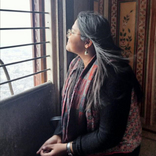For smooth Ad free experience
Known for her heart-warming renditions, she is that face of Hindustani music who paved the way for women to enter the arena of bringing their melodious voices to the forefront, quite literally. Her reputation today as a perceptive connoisseur of both classical and popular music is well-deserved.
Died on 20th November 1989
A true era of transformation for Indian Classical Music took place in the early 20th century when princely courts or royal patronage were old enough to give way the era to recording music with technical equipment. Nonetheless, the essence of classical Indian music in its traditional form is a gift from God that has been well preserved by the gharanas and its members in adherence to their diverse musical styles. The one we are addressing today is the versatile singer and pioneering vocalist Hirabai Barodekha, she belongs to the Kirana Gharana, and came to the fore just when it was needed.
In a time when classical music was just emerging and entering an era with accessibility to all segments of society, it became a major boost for an artist, and Hirabai, who was born into a family of classical musicians and adopted music as her passion. With a career spanning over more than a decade, she not only established herself as one of India's leading vocalists but also broke down barriers imposed on women who were into music and unknowingly led a silent cultural revolution.
While Hirabai's journey led to the revival of music in the Indian context, her relationship with music is relatively old for her father Ustad Abdul Karim Khan was a revered court musician and the founder of the Kirana Gharana. Similarly, her mother Tarabai Mane belonged to the royal family of Baroda and was a disciple of Ustad itself. Upon falling in love and deciding to marry each other, their families weren't too comfortable with the relationship, so the couple had to move out.
Including Hirabai, there were five siblings all aspiring to be successful musicians. However, Hirabai being the eldest sister and younger to her brother Suresh Babu had a long road to follow before becoming a musician. It was solely because at that time, an Indian woman performing on stage was frowned upon and her father wanted a 'respectable' life for all of her daughters instead of involving them in music. In fact, prior to her arrival on the scene, female professional singers who performed in public had a reputation of being uncultured. As it was, women in art were intended only to appeal to men and were paid for their charms rather than for their artistic abilities
As it turns out, Hirabai was exceptionally good right from a very young age, so this talent of hers could not be suppressed any longer by her father's restrictions or societal constraints. As her elder brothers got all the lessons, she would pay close attention to them, then practice the patterns and sequence by herself.
In the face of this, Tarabai didn't have the choice but to acknowledge her daughter's talent and finally permitted her to pursue her passion for music. This is how Hirabai's musical career was launched under the tutelage of Abdul Wahid Khan, who himself was a member of Kirana Gharana.
In addition to khayal-singing, she excelled in thumri, bhajan, bhavgeet, and natyageet. Her devotion to music was so intense that she once strove to perfect one rendition for three months. While her father had a relatively less role in making her a music genius, Hirabai greatly acknowledged the role of Abdul Karim Khan and her brother Suresh Babu in making her master these gems.
Hirabai further gained mastery over multiple styles during the course of her training. While there are no prerequisites for learning the music in Gharana's, it didn't take Hirabai long to become accustomed to Kirana. She sang it with much grace and elegance that enchanted both audiences and music experts. It further enhanced her reputation as a Kirana Gharana singer.
It was a legendary vocalist who invited her to perform at an anniversary celebration in 1921 that marked the beginning of her performance career, and consequently, her first performance at a national level arose at the 1937 All-India Music Conference in Calcutta.
The restless spirit in her would not remain confined to stage performances. With this determination, she decided to become a recording artist, achieving a sort of record by staging the first full-priced public concert. Her success was extreme in every domain.
Her biggest career milestone came the day she sang 'Vande Mataram' at the jubilant independence day celebrations held in Red Fort on the 15th of August 1947. S*he later founded a music school called *Nutan Sangeet Vidyalaya, where budding young women singers studied Hindustani classical to propagate music at the grassroots level.
Both in the context of direct engagement with audiences and even with her own music, Hirabai promoted women's musicianship as respectable and worthy of further recognition.
“When your mind is troubled and distraught, you could do no better than listen to Hirabai’s music. It has an uncanny quality of conveying a sense of peace.”- Those were the words Ramakrishna Buva Vaze, a revered maestro from the Gwalior gharana, used to describe Hirabai Barodekar's art.
She was given the title of Gayan Kokila (The Nightingale of India) by Sarojini Naidu and has performed at numerous jalsas, won acclaim and recognition nationally including that of Padma Shri but is perhaps most hailed for her work in making traditional music accessible to the masses. An age-old convention that prohibited women from taking professional space in artistic endeavors has been broken by this simple woman with great resolve.

You might be interested in reading more from
